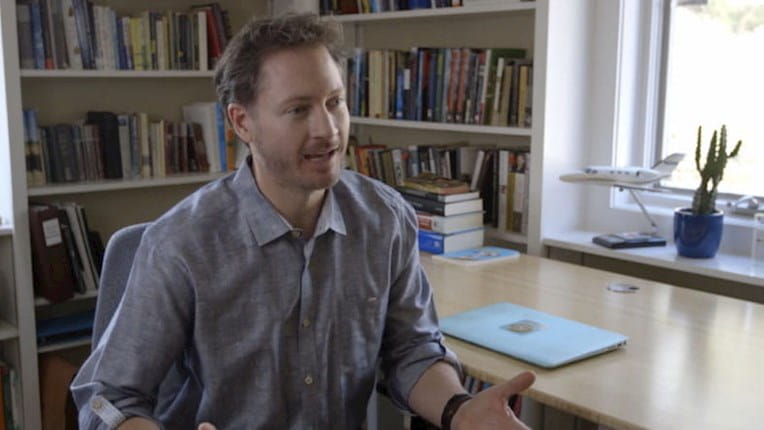Ever focused on the future of humanity, Johnson launched OS Fund in support of “the world’s most audacious” scientists and entrepreneurs who are working to rewrite the operating systems of life. He combines business acumen with an insatiable imagination to fuel his endeavors, which also include writing children’s books. His defining belief is that we’re at a uniquely exciting moment in the story of humanity, because we can now literally create any kind of world we can imagine.
HITTING THE RESTART BUTTON AT BOOTH
“I’d started a few companies including one small success and two big failures. I was exhausted and wanted to take a break. I thought business school would be a nice time to collect my thoughts. After visiting several schools, I determined that if I didn’t get accepted at Booth, I just wasn’t going to go.”
At Chicago Booth, Johnson focused on developing as a leader and decision-maker. “As I’ve progressed throughout my career, I’ve spent more and more time working on how I think, particularly on understanding my underlying assumptions and mental models, questioning those, and then going deeper. Booth was a great help in this exploration as I worked to understand the world and dissect my own thinking.”
FUTURE-FOCUSED VISION
“In order for our society to thrive, we are dependent upon scientific breakthroughs to address our needs,” Johnson says. “But funding these scientific endeavors is very challenging, because often they have long runways with a lot of risk.”
The OS Fund’s investments range from companies working on synthetic biology and extending healthy human lifespan, to artificial intelligence, energy storage, and next-gen transportation.
“I invest in future-literate entrepreneurs, which I define as those who create mental models for the emerging future while living experimentally and adventurously.
They’re working on any one of humanity’s most audacious challenges or opportunities, and aiming to improve the lives of billions of people for generations to come.”
To create a more robust ecosystem for investing in such entrepreneurs, OS Fund developed a decision-making model it then open sourced to help others better understand the risks and potential of these promising sci-tech companies.
“Having attended Booth, it was really helpful in understanding how we could frame our thought processes to try and make good decisions about these endeavors that truly could have a very large impact on humanity, but just weren’t receiving the investment capital from the community.”
Johnson stresses that the smallest details make a huge difference in the success or failure of a new business. “Booth provides entrepreneurs basic startup infrastructure assistance but also helps in company strategy formation,” he says. “They close the gap on the difficulty of actually starting a company and help increase the likelihood of success.”
MEASURING SUCCESS
Johnson’s mantra is straightforward. “Success is a journey. It is not about an arrival. I don’t believe success is a fixed point, or somewhere we arrive. It’s the journey, and how we deal with the opportunities and challenges that come our way.”
He says: “There is risk in everything. It is not a question of whether someone is a risk taker. It is a question of what risk are you willing to take in life. To me, the biggest risk was not working on the things I found most meaningful.”
THE REALLY BIG PICTURE
In addition to OS Fund, Johnson is working on an initiative to orient youth around our newly developed and incredibly powerful tools of creation and to embolden them to become changemakers and the creators of humanity’s future.
“There’s a reason why I want to invest in young people. I am a father of three, and I love my children very much. I work incredibly hard to be a good father, but also I see them as humanity’s future creators. They will have the ability to author our world unlike any other generation. I want to invest in them now, so when they are older, they have the aspirations and vision to create something remarkable.”

